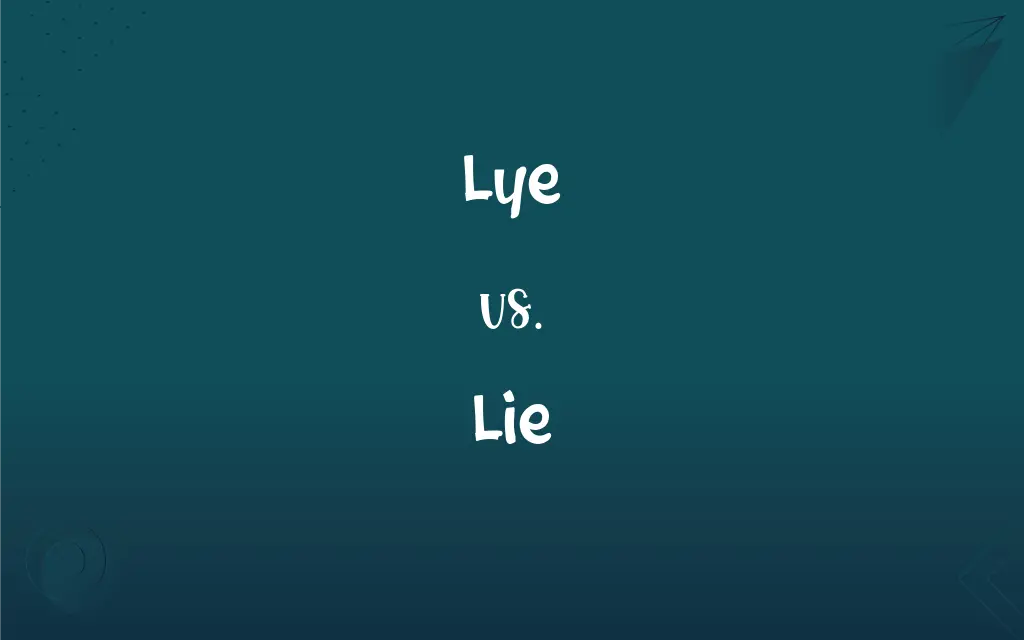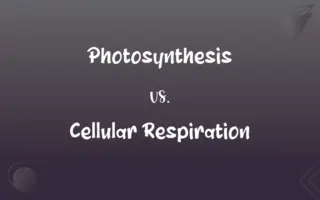Lye vs. Lie: What's the Difference?
Edited by Aimie Carlson || By Harlon Moss || Updated on October 21, 2023
Lye is a strong alkaline substance, while lie refers to a false statement or a resting position.

Key Differences
Lye and lie are English words with entirely different meanings, where lye is related to chemistry and lie is either related to falsehood or position.
Lye refers to a strong alkaline substance, often used in soap-making, while lie can refer to an untruth told by someone.
When talking about substances, one might come across lye in the context of cleaning or manufacturing, but lie would not fit in such a context.
In another sense, to lie down refers to the act of reclining or resting in a horizontal position, a definition far removed from lye's chemical nature.
It's essential to understand the context in which lye and lie are used to grasp their distinct meanings correctly.
ADVERTISEMENT
Comparison Chart
Part of Speech
Noun
Verb (action) or Noun (statement)
Meaning
Alkaline substance
To recline or a false statement
Usage
Chemistry, soap-making
Describing position or truthfulness
Etymology
From Middle English "lige", alkali
From Old English "licgan", to be in a position
Examples
Used in making soap
"Don't tell a lie" or "I will lie down"
ADVERTISEMENT
Lye and Lie Definitions
Lye
Lye is a caustic alkali.
Many traditional soaps are made using lye.
Lie
Lie means to recline.
I will lie on the couch.
Lye
Lye can be derived from wood ash.
Historically, lye was obtained by leaching wood ashes.
Lie
Lie is a statement meant to deceive.
Trust is broken by a lie.
Lye
Lye is essential for saponification.
Lye reacts with fats to produce soap.
Lie
Lie refers to an untruth.
She was caught in a lie.
Lye
Lye is used in food preparation.
Some pretzels are dipped in a lye solution before baking.
Lie
Lie denotes a particular position.
The town lies to the east of the river.
Lye
Lye can be a safety hazard.
Always wear gloves when working with lye.
Lie
Lie can indicate the resting place.
The book lies on the table.
Lye
The liquid obtained by leaching wood ashes.
Lie
To be or place oneself at rest in a flat, horizontal, or recumbent position; recline
He lay under a tree to sleep.
FAQs
Can "lie" refer to both a statement and an action?
Yes, lie can mean a false statement or the act of reclining.
Is telling a lie always wrong?
Ethics vary, but many believe lying breaks trust and is generally wrong.
Are lye and lie homophones?
No, lye rhymes with "pie," and lie rhymes with "sky," but they sound very similar.
Is lye dangerous?
Yes, lye is caustic and can cause burns if not handled properly.
How is lye produced?
Traditionally, lye was produced by leaching wood ashes, but today it's often manufactured.
What precautions should one take with lye?
Always wear protective gear, avoid skin contact, and store lye safely.
What's the difference between "lie" and "lay"?
"Lie" is intransitive (e.g., I lie down), while "lay" requires a direct object (e.g., I lay the book down).
How does "lie" function grammatically?
"Lie" can function as both a verb (e.g., to recline) and a noun (e.g., a falsehood).
What's the past tense of the verb "lie" as in reclining?
The past tense is "lay."
Is lye natural?
Lye can be derived naturally from wood ash or produced synthetically.
Can lye be used in cooking?
Yes, lye is used in some food preparations, like pretzels, but it must be used with caution.
Can lye be used for cleaning?
Yes, due to its caustic nature, lye can be used for cleaning, but with care.
Is lye present in all soaps?
Lye is used in the saponification process, but it's reacted out in properly made soap.
How can you spot a lie?
It's challenging, but inconsistencies in stories, body language, or tone might indicate deceit.
Is lye used in hair relaxers?
Yes, lye is an active ingredient in some hair relaxers.
What are the consequences of telling a lie?
Lies can damage trust, harm relationships, or lead to other negative outcomes.
What's the opposite of a lie?
The opposite of a lie, in terms of truthfulness, is the truth.
Can lye be harmful if ingested?
Yes, ingesting lye is dangerous and can cause serious harm.
Why might someone tell a lie?
Reasons vary, including avoiding trouble, sparing feelings, gaining advantage, or various psychological reasons.
Is lye environmentally friendly?
While lye breaks down naturally, its caustic nature can be harmful in concentrated amounts.
About Author
Written by
Harlon MossHarlon is a seasoned quality moderator and accomplished content writer for Difference Wiki. An alumnus of the prestigious University of California, he earned his degree in Computer Science. Leveraging his academic background, Harlon brings a meticulous and informed perspective to his work, ensuring content accuracy and excellence.
Edited by
Aimie CarlsonAimie Carlson, holding a master's degree in English literature, is a fervent English language enthusiast. She lends her writing talents to Difference Wiki, a prominent website that specializes in comparisons, offering readers insightful analyses that both captivate and inform.































































